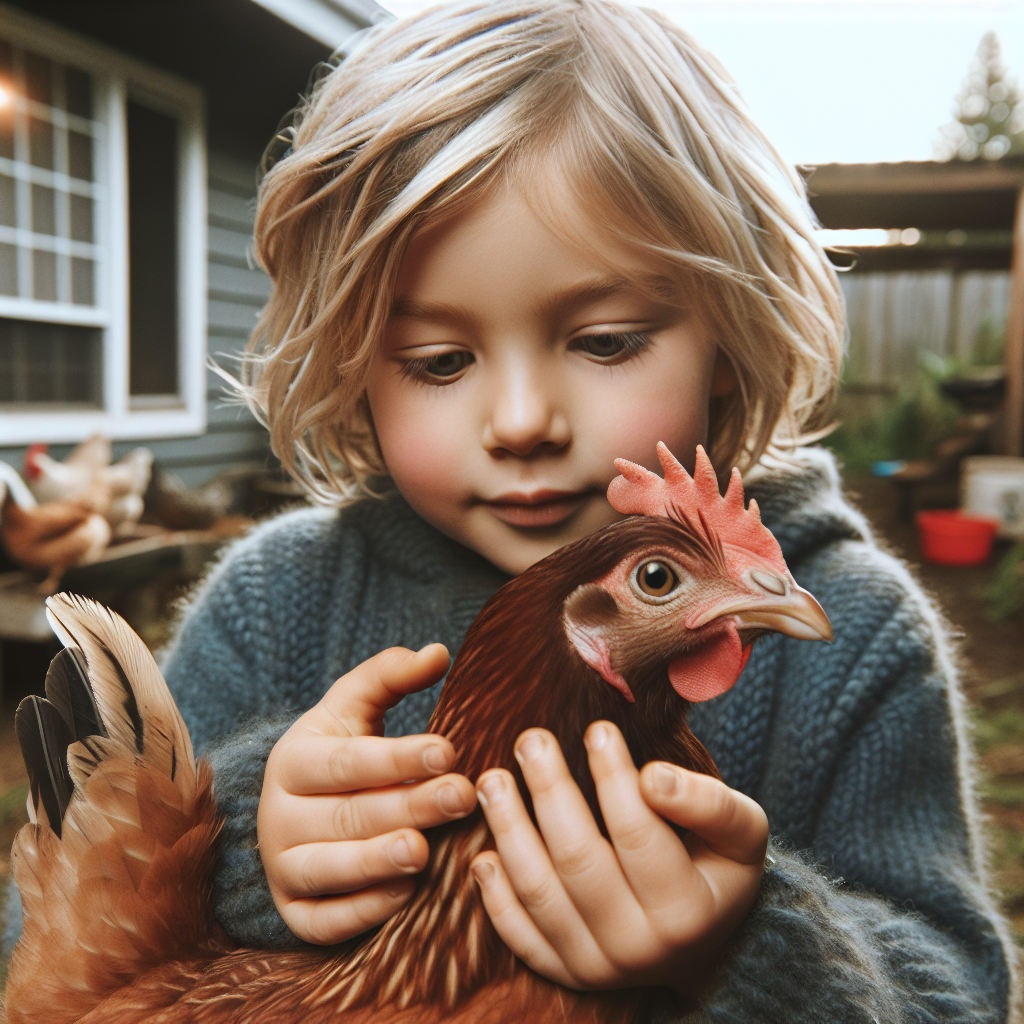If you’re a backyard chicken enthusiast and want to share your passion for responsible chicken care with your family or kids, you might be wondering how to approach this educational journey. Fortunately, there are various engaging and informative methods you can employ to instill a sense of responsibility in your loved ones when it comes to looking after feathered friends in the backyard. From hands-on activities to open discussions, incorporating education about chicken care can be an enriching experience for the entire family.
Why teach your family or kids about responsible backyard chicken care?
Teaching your family or kids about responsible backyard chicken care can have numerous benefits. Not only does it provide the opportunity to learn about the natural world and sustainable living, but it also teaches important values such as empathy, responsibility, and compassion. By involving the whole family in chicken care, you can strengthen bonds, promote teamwork, and create a sense of shared responsibility. Additionally, backyard chickens offer a unique opportunity for children to understand the cycle of life, where food comes from, and the importance of respecting and caring for living creatures. Building a sustainable lifestyle through responsible backyard chicken care can also contribute to reducing our carbon footprint and increasing self-sufficiency.
Benefits of backyard chickens
Owning backyard chickens brings various benefits that go beyond the educational aspect. First and foremost, they provide a sustainable and eco-friendly source of fresh eggs. By raising your own chickens, you can ensure the quality and freshness of the eggs, while also reducing packaging waste and supporting a more sustainable food system. Additionally, chickens are natural pest control agents, as they eat insects harmful to gardens, reducing the need for chemical pesticides. Their waste can also be composted and used as a nutrient-rich fertilizer for plants. Overall, backyard chickens contribute to a more sustainable and self-sufficient lifestyle.
Teaching responsibility and empathy
Caring for backyard chickens is an excellent way to teach children about responsibility and empathy. Assigning specific responsibilities to each family member helps instill a sense of ownership and accountability. Children can learn the importance of daily care routines, such as feeding, watering, and cleaning the coop, ensuring that the chickens live in a clean and healthy environment. By involving children in the decision-making process, such as choosing the breed or coop design, they can develop problem-solving and critical thinking skills. Through interacting with chickens, children can also learn empathy by observing their needs, behaviors, and emotions.
Building a sustainable lifestyle
Teaching your family or kids about responsible backyard chicken care is a gateway to building a sustainable lifestyle. By integrating the care of chickens into your daily routine, you can instill sustainable practices in your family’s way of life. For example, composting chicken waste and using it as fertilizer reduces the need for chemical fertilizers, contributing to a greener and healthier environment. Additionally, the experience of raising chickens teaches children about the importance of animal welfare and respecting the natural world. These values can extend beyond the care of chickens and influence other aspects of their lives, such as making conscious choices about food, waste reduction, and environmental conservation.
Understanding the basics of chicken care
Before embarking on the journey of backyard chicken care, it is crucial to understand the basics. This includes choosing the right breed, providing a suitable living environment, ensuring proper nutrition, maintaining hygiene and cleanliness, monitoring chicken health, and addressing common challenges.
Choosing the right breed
When selecting a breed, consider the climate, available space, and your family’s preferences. Some breeds are better suited to colder climates, while others thrive in hot weather. Consider factors such as egg-laying capacity, temperament, and desired chicken size. Research various breeds to determine which best fits your family’s needs and goals.
Providing a suitable living environment
Creating a suitable living environment for your chickens is essential for their health and well-being. The coop should provide shelter from the elements, protection from predators, proper ventilation, and adequate space for the number of chickens you plan to raise. Provide nesting boxes for egg-laying, perches for roosting, and bedding materials for cleanliness and comfort.
Feeding and watering
A balanced diet is crucial for the health and productivity of your chickens. Provide them with a nutritionally balanced feed specifically formulated for their age and purpose (e.g., egg-laying or meat production). Additionally, ensure they have access to fresh, clean water at all times. Monitor their feed consumption and adjust quantities as needed.
Maintaining hygiene and cleanliness
Keeping the coop clean and maintaining good hygiene practices is essential in preventing disease and promoting chicken health. Regularly clean the coop by removing bedding, replacing it with fresh material, and sanitizing surfaces. Monitor and remove any waste buildup promptly. Properly dispose of or compost chicken waste to avoid contamination.
Monitoring chicken health
Regular monitoring of chicken health is crucial to detect any signs of illness or injury early. Observe their behavior, appetite, egg production, and physical appearance daily. Look out for signs of distress, abnormal droppings, feather loss, or any other unusual symptoms. Establish a relationship with a local veterinarian or poultry expert who can provide guidance and assistance when needed.
Addressing common challenges
Owning backyard chickens may come with its fair share of challenges. From predators to diseases, it is important to be informed and prepared. Educate yourself and your family about common chicken health issues, such as mites, respiratory infections, or egg-binding. Implement measures to prevent predators, such as reinforcing the coop with sturdy fencing and incorporating electric fencing if necessary. Have a plan in place to address any emergencies that may arise.
Getting the whole family involved in chicken care
Involving the whole family in chicken care not only lightens the workload but also creates a sense of shared responsibility and encourages teamwork. By assigning specific responsibilities to each family member, everyone has a role to play in ensuring the well-being of the chickens.
Assigning specific responsibilities
Assigning specific responsibilities helps distribute the workload and instills a sense of ownership in each family member. Depending on age and capability, tasks can include feeding the chickens, refreshing water, cleaning the coop, collecting eggs, and monitoring chicken health. Rotate responsibilities periodically to promote a varied learning experience and prevent monotony.
Creating a daily care routine
Establishing a daily care routine helps ensure that the chickens receive consistent and reliable care. Have a set time each day to feed the chickens, check their water supply, and clean the coop if necessary. This routine not only benefits the chickens but also teaches children the importance of commitment and following a schedule.
Promoting teamwork
Caring for backyard chickens provides a perfect opportunity to promote teamwork within the family. Encourage family members to work together, help each other with their assigned tasks, and communicate effectively. This collaboration fosters a sense of shared responsibility, unity, and cooperation.
Encouraging observation and problem-solving skills
Caring for chickens involves continuous observation and problem-solving. Encourage family members to observe the chickens’ behavior, identify any changes or issues, and brainstorm possible solutions. This cultivates critical thinking skills, encourages curiosity, and enhances the ability to empathize and understand animals’ needs.
Teaching children about compassion and empathy towards chickens
Caring for chickens can be an enriching experience for children, teaching them about compassion, empathy, and responsible animal care. By promoting gentle handling, explaining the importance of respecting chickens’ space, and discussing their needs and behaviors, children can develop a deep understanding and empathy towards these animals.
Discussing the needs and behaviors of chickens
Engage children in conversations about the needs and behaviors of chickens. Discuss their natural instincts, such as scratching, pecking, and dust bathing, which help keep them healthy and happy. Talk about their dietary requirements, social hierarchy, and the importance of providing a safe and secure environment.
Encouraging gentle handling and interactions
Teach children the importance of gentle handling and interactions with chickens. Demonstrate how to approach chickens calmly, avoiding sudden movements or loud noises that may startle them. Encourage children to develop a bond with the chickens through regular gentle interactions, such as hand-feeding, petting, or talking softly to them. Emphasize the need to be respectful and mindful of the chickens’ comfort and well-being.
Explaining the importance of respecting their living space
Help children understand the concept of personal space and the importance of respecting the living space of chickens. Explain that chickens need a clean and safe coop where they can rest, lay eggs, and roost. Teach children how to keep the coop tidy, provide fresh bedding, and ensure that chickens have enough space to move around comfortably. Instilling respect for the chickens’ living space extends beyond the coop and helps children understand the importance of respecting animals and the environment in general.
Incorporating chicken care into homeschooling or family education
Backyard chicken care can be integrated into homeschooling or family education as a hands-on and interdisciplinary learning experience. By incorporating chicken care into science lessons, learning about sustainable practices, documenting the chicken care journey, and involving children in chicken-related research and reading, you can provide a well-rounded education.
Integrating chicken care into science lessons
Use backyard chickens as a practical example for teaching various scientific concepts. Explore topics such as life cycles, nutrition, reproduction, and animal behavior through hands-on observations and research. Measure and record egg sizes, calculate feed consumption, and conduct experiments to investigate different aspects of chicken care.
Learning about sustainable practices
Teaching children about responsible backyard chicken care naturally leads to discussions about sustainability. Explore sustainable practices such as composting, waste reduction, and organic gardening alongside chicken care. Discuss how the chickens’ waste can be used as fertilizer and the benefits of reducing reliance on commercial food production.
Documenting the chicken care journey
Encourage children to document their chicken care journey through journals, photos, or videos. This documentation not only serves as a record of their learning but also allows them to reflect on their experiences and track the chickens’ growth. Encourage children to share their observations, insights, and challenges they encountered along the way.
Involving children in chicken-related research and reading
Foster a love for learning by involving children in chicken-related research and reading. Encourage them to explore books about chickens, their behavior, and their role in sustainable living. Support their curiosity by guiding them towards reputable online resources or local libraries where they can conduct research on specific chicken-related topics.
Engaging children in chicken-related activities and projects
In addition to the daily care routine, engaging children in chicken-related activities and projects can further enhance their learning and enjoyment. By building or designing a chicken coop, creating educational posters or charts, organizing chicken-themed art or writing contests, or developing chicken-based science experiments, children can explore their creativity and deepen their understanding of chicken care.
Building or designing a chicken coop
Involve children in the construction or design of the chicken coop. This hands-on project allows them to learn about coop functionality, architectural principles, and construction techniques. Encourage them to contribute ideas, make sketches, and assist with tasks appropriate for their age and skill level. Building the coop together fosters a sense of accomplishment and pride.
Creating educational posters or charts
Encourage children to create educational posters or charts that highlight important aspects of responsible chicken care. They can design informative visuals about chicken breeds, nutrition requirements, or coop maintenance. Display these posters in the chicken area or share them with others to spread awareness about responsible backyard chicken care.
Organizing a chicken-themed art or writing contest
Stimulate creativity by organizing a chicken-themed art or writing contest. Children can create artwork depicting chickens, their habitat, or their role in sustainable living. Alternatively, they can write stories, poems, or informative essays about chicken care, emphasizing responsible practices and the benefits of raising backyard chickens.
Developing a chicken-based science experiment
Engage children in scientific inquiry by developing chicken-based experiments. For example, children can investigate the impact of different diets on eggshell quality, conduct experiments to observe the effects of environmental conditions on chicken behavior, or explore the efficiency of different cleaning methods for maintaining coop hygiene. These experiments foster critical thinking, data analysis, and scientific reasoning skills.
Learning from other experienced backyard chicken owners
Learning from experienced backyard chicken owners can provide valuable insights and guidance. By attending local workshops or events, joining online chicken-raising communities, visiting educational farms or poultry shows, and arranging farm visits or volunteer opportunities, children and families can broaden their knowledge and connect with like-minded individuals.
Attending local chicken-raising workshops or events
Local workshops or events focused on chicken raising provide an excellent opportunity to learn from experienced individuals. These gatherings often cover a wide range of topics, from breed selection and coop design to nutrition and health management. Attending such workshops allows children and families to ask questions, gain practical knowledge, and connect with local chicken enthusiasts.
Joining online chicken-raising communities
The internet offers a wealth of information and community support for backyard chicken owners. Joining online forums, social media groups, or dedicated websites allows children and families to connect with experienced chicken owners worldwide. By participating in discussions, asking questions, and sharing experiences, they can learn from the collective wisdom of the community.
Visiting educational farms or poultry shows
Visiting educational farms or attending poultry shows provides a hands-on experience and a chance to see different chicken breeds up close. Many educational farms offer guided tours or workshops specifically focused on backyard chicken care. Poultry shows showcase various breeds, allowing children and families to observe differences in appearance, behavior, and qualities.
Arranging farm visits or volunteer opportunities
If available in your area, consider arranging farm visits or volunteer opportunities at local farms or community gardens. This firsthand experience allows children and families to witness chicken care in action, learn from experienced farmers, and understand the broader context of sustainable practices. Volunteering opportunities may involve tasks such as feeding, cleaning, or assisting with coop maintenance.
Instilling safe practices and proper chicken handling techniques
Ensuring the safety of both the chickens and the caregivers is of utmost importance when teaching children about responsible backyard chicken care. By teaching children about proper handwashing, demonstrating safe interactions with chickens, and highlighting potential health hazards and precautions, you can foster a safe and enjoyable chicken care experience.
Teaching children about proper handwashing
Emphasize the importance of proper handwashing before and after handling chickens. Teach children to use warm water and soap, lathering their hands thoroughly for at least 20 seconds. Explain that this practice helps prevent the spread of bacteria and diseases that may be present in chicken droppings.
Demonstrating safe interactions with chickens
Show children how to safely interact with chickens to prevent any harm to the animals or themselves. Teach them to approach chickens calmly, avoiding quick movements or loud noises that may startle them. Demonstrate how to hold chickens securely but gently, supporting their bodies to prevent injury. Children should always be supervised when handling chickens, especially when they are young or unfamiliar with the birds.
Highlighting potential health hazards and precautions
Educate children about potential health hazards and precautions associated with chicken care. Discuss the risk of salmonella and other infections that can be transmitted from chickens to humans. Teach children to avoid touching their faces or mouths while handling chickens and to wash their hands thoroughly afterward. Ensure they understand the importance of wearing proper attire, such as closed-toe shoes and gloves, to protect themselves from scratches or bites.
Making chicken care a fun and interactive experience
By making chicken care a fun and interactive experience, you can keep children engaged and excited about their responsibilities. Designing scavenger hunts or quizzes about chickens, organizing chicken-themed games or competitions, rewarding achievements and milestones, and celebrating chicken-related holidays or milestones can transform chicken care into an enjoyable and memorable activity.
Designing scavenger hunts or quizzes about chickens
Create scavenger hunts or quizzes related to chickens to make learning about them entertaining and engaging. Hide chicken-themed facts, pictures, or objects around the chicken area or the backyard, and challenge children to search for and identify them. Alternatively, design quizzes with questions about chicken breeds, behaviors, or nutritional needs, turning learning into a playful competition.
Organizing chicken-themed games or competitions
Organize games or competitions that revolve around chickens to add an element of excitement to the chicken care routine. Whether it’s an egg-and-spoon race, a chicken-themed obstacle course, or a chicken trivia quiz, these activities encourage active participation and reinforce knowledge about responsible chicken care. Make sure the games are safe and age-appropriate for all participants.
Rewarding achievements and milestones
Recognize and reward achievements and milestones in chicken care to motivate and acknowledge children’s efforts. Create a system where they can earn badges, stickers, or certificates for completing tasks, learning new skills, or reaching specific milestones. Celebrating their accomplishments reinforces a positive learning experience and encourages continuous engagement.
Celebrating chicken-related holidays or milestones
Integrate chicken-related holidays or milestones into your family’s calendar to make chicken care celebrations more festive. Whether it’s an annual “Chicken Appreciation Day,” a celebration of a chicken’s hatchday (birthday), or a special event to mark the chickens’ first egg, these occasions provide an opportunity to gather as a family, reflect on the responsibility of caring for chickens, and cherish the joyful moments they bring.
Encouraging children to share their knowledge with others
Encourage children to share their knowledge and experiences in responsible backyard chicken care with others. By hosting chicken care workshops, creating informative presentations for school or community events, and writing articles or blog posts, children can become ambassadors for responsible chicken care and inspire others to embrace sustainable living practices.
Hosting chicken care workshops for friends and neighbors
Invite friends, neighbors, or other interested individuals to participate in chicken care workshops hosted by your family. Children can serve as instructors, sharing their knowledge and experiences with responsible chicken care. Provide hands-on demonstrations, answer questions, and offer practical tips to empower others to embark on their own chicken care journey.
Creating informative presentations for school or community events
Encourage children to develop informative presentations about responsible backyard chicken care for school or community events. They can share their experiences, insights, and the benefits of raising backyard chickens with a wider audience. Use visual aids, videos, or live chicken interactions (if permitted) to engage the audience and make the presentation more impactful.
Writing articles or blog posts about responsible chicken care
If your child enjoys writing, encourage them to write articles or blog posts about responsible backyard chicken care. They can share their personal experiences, practical tips, and engaging stories about their chickens. Publish these articles on family blogs, community newsletters, or local publications to reach a broader audience and inspire others to embrace responsible chicken care.
By teaching your family or kids about responsible backyard chicken care, you are not only expanding their knowledge but also imparting values of empathy, responsibility, and sustainability. It is a holistic learning experience that builds connections with nature, fosters teamwork, and encourages children to become ambassadors for responsible chicken care. As your family journeys through the rewarding experience of raising backyard chickens, enjoy the countless lessons, memories, and joys that come with it.




